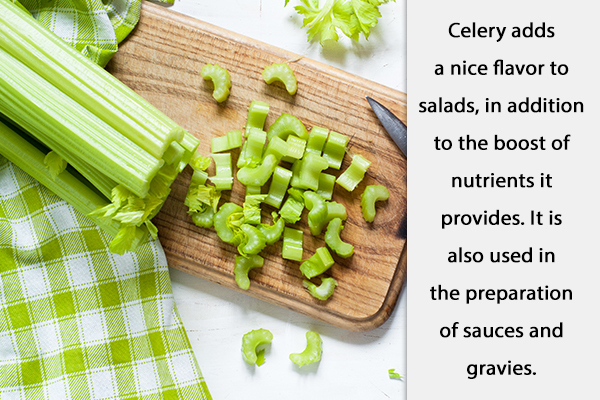In this article:
Celery has long been promoted as a low-calorie diet and health food. Belonging to the parsley family, it is native to the Mediterranean and some areas of the Middle East.

The plant with its tall and fleshy stalks is used for flavoring a variety of dishes. Some also eat it raw in salads or with dips.
Nutritional Information
One stalk of raw celery contains 38.2 g of water, making it a good source of hydration. It also has 5.6 calories, 1.19 g of carbohydrate, 0.28 g of protein, 0.1 g of fat, and total fiber of 1 g per stalk. It also has 9.6 g of phosphorus, 16 mg of calcium, 4.4 mg of magnesium, 104 mg of potassium, and 32 mg of sodium.
It also has 108 µg of beta carotene and 113 µg of lutein, contributing to its rich antioxidant profile.
Health Benefits of Celery in Just One Stalk
Consuming celery can do wonders for your health. Here are some of its benefits:
1. Provides antioxidant effects
Just a single stalk of celery contains several antioxidant compounds including caffeic acid, apigenin, tannin, and kaempferol, which exhibit antioxidant effects by removing free radicals from the body. (1)
According to studies, celery is the most important source of phytochemicals including phenolic acid, flavones, flavonoids, vitamin C, beta carotene, and manganese. These antioxidants decrease substances that cause inflammation in the body.
Flavonoids also reduce cardiovascular inflammation, which is a risk factor for many cardiovascular diseases. (2)
2. Reduces cardiovascular risks

Celery is known to have some positive influence on heart health. In a study done on rats fed with celery seed extract, a relaxation of vascular muscles was observed. (3) This relaxation of blood vessels is critical in the management of high blood pressure.
In another study on a 74-year-old man fed with celery juice for 6 months, some reduction in blood pressure was observed. (4)
Celery also exhibits some antiplatelet activity, preventing damage to the heart, as well as reducing some markers associated with cardiovascular diseases. (5)
Most studies on the health effects of celery are limited, and more human trials and interventions are needed to establish conclusive results. However, consumption of recommended servings of a variety of vegetables for cardio protection is well established.
3. Aids digestive health
Apigenin, a major flavonoid found in celery, interacts with gut microorganisms. A healthy and diverse gut microbiota is critical to overall health. It has been recently found that gut microorganisms also help in maintaining a healthy immune system. (6)
In vitro testing showed that apigenin promoted the growth and diversity of human gut bacteria. It also encouraged the growth of butyrate, a short-chain fatty acid associated with gut health. (7)
But perhaps one of the most obvious health benefits of celery comes from its fiber content. With almost 1 g of fiber in just one stalk, it is a rich source of dietary fiber. Studies have shown that diets low in fiber predispose a human to many chronic illnesses including obesity, diabetes, and cardiovascular diseases.
Dietary fiber also provides bulk to the stool, easing its passage along the digestive tract. (8)
4. Contributes to diabetes management

Celery has high fiber content, making it a low-glycemic-index (GI) food. Low-GI foods are effective at managing blood glucose levels and reducing HbA1c. They also reduce cholesterol levels, which need management among people with diabetes. (9)
Furthermore, antioxidants in fruits and vegetables have been hypothesized to protect against diabetes due to their positive effects. (10) The full role of antioxidants is not yet known, but an antioxidant diet is generally good for several illnesses that create oxidative stress in the body.
5. Exhibits alkalizing effects
Fruits and vegetables are considered alkalizing foods. Celery is no different. (11)
A lot of studies have been conducted to investigate the benefits of including alkalizing foods in the diet – from protecting bone mass to guarding the body against environmental stresses. (11)
More studies are needed to fully establish the protective role of alkalizing foods, yet the existing evidence shows some promise.
6. Improves fertility and sexual health
Free radical damage within the body that results from the diet or environment causes harm to several organs and can impact their function.
In a study done on rats, the consumption of celery showed improvements in the formation of mature sperms and protected the cells against damage. (12)
Antioxidants, such as those present in celery, improve sperm count and fertility. (12) And although human trials are needed, the current data are a promising groundwork for future research into the benefits of celery for improving fertility.
7. Improves cognition
Celery is a rich source of polyphenols that neutralize free radicals in the body. (13) These phenolic compounds play a protective role against memory loss and age-related degenerative diseases such as Alzheimer’s disease.
How to Consume Celery

Celery’s rich nutrient content is best enjoyed raw alongside dips and other vegetables. Celery also adds a nice flavor to salads, in addition to the boost of nutrients it provides. It is also used in the preparation of sauces and gravies.
Some people consume celery juice. However, juicing removes most of its fiber, taking away its benefits.
Precautions to Consider
Like any other vegetable, it is not recommended to have more than the recommended daily serving of celery. Overconsumption can lead to an accumulation of nutrients, specifically minerals that can cause imbalances in the body’s electrolyte levels.
When consuming celery in juice form, remember that juicing will require you to use more of the vegetable than you would consume raw. In such a case, it is best to prepare the juice in combination with other fruits to ensure you take no more than the recommended serving.
Most-Asked Questions About Celery
Can I buy celery in bulk and store it?
It is advisable to consume fresh celery. If buying frequently is not feasible, ensure you do not store your vegetable for more than 4–5 days.
Can I precut and store celery?
Precut and stored vegetables often lose some of their minerals. If you have to meal prep in advance due to time constraints or a busy schedule, do not store your meals for more than 2 days.
Final Word
Nature has loaded fruits and vegetables with vitamins and minerals that are protective against several chronic illnesses. Amongst them, some vegetables have a slightly upper edge with regards to certain conditions.
Celery, with its rich antioxidant profile along with low-calorie and high-fiber content, is beneficial for several conditions such as diabetes, cardiovascular diseases, digestive health, and systemic inflammation.
It is only imperative to consume celery in its recommended serving size to avoid overdosing on nutrients, the effects of which have not yet been fully studied.
- Was this article helpful?
- YES, THANKS!NOT REALLY


